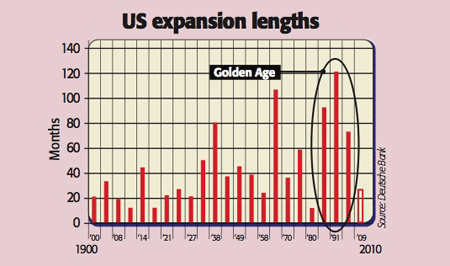
Ever since the turn of the millennium, the overall trend in developed world stockmarkets has been flat to down. And we’d better get used to more of the same, according to Deutsche Bank’s annual Long-term Asset Return Study. Expect another “highly unstable” decade with large ups and downs for stocks. Overall, “buy-and-hold will generally be a fairly poor option in developed markets”.
That’s partly because economic cycles are getting shorter, reckons the report. American expansions were abnormally long in the ‘Golden Age’ of the 1980s and 1990s. This was due to a long-term slide in inflation, the result of falling costs due to globalisation. These developments kept a lid on interest rates.
“Western authorities ‘maxed out’ on the benefits of this [decline in inflation] by pumping monetary and fiscal stimulus into their economies whenever they had an economic problem. Given the lack of inflationary pressure they had a rare ability to do this without the normal subsequent price rises.” As interest rates kept falling, public and private debt rose to “previously unthinkable levels”.
The fact that the 1980s and 1990s were an aberration (see chart), along with the fragile post-credit bubble environment, with years of deleveraging looming, suggests that we are returning to a more traditional length of business cycle.
Since 1854, American expansions have lasted an average of 39 months. That suggests that the next recession could start by August 2012, to be followed by further recessions in 2016 and 2020.
Meanwhile, “we live in a world of near-all-time-high profit margins”, which tend to revert to the average over time. The same goes for valuations, which remain historically high. A rise in inflation, a likely result of money printing in the West, also tends to depress valuations. The S&P’s price/earnings ratio is still in the teens and nowhere near the single digits typical of the bottom of a long-term bear market. “We don’t think we can truly shake off the 2000 equity market bubble until we’ve approached such lows.”
Add it all up and you begin to see why Deutsche is pencilling in real annualised returns of -2.6% over the next five years and 0.6% over ten. It will be some time before the US, and the rest of the developed world, has recovered from the hangover caused by the long debt binge.